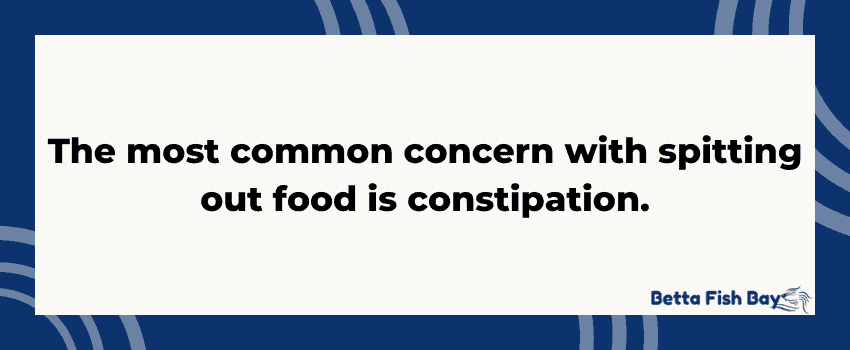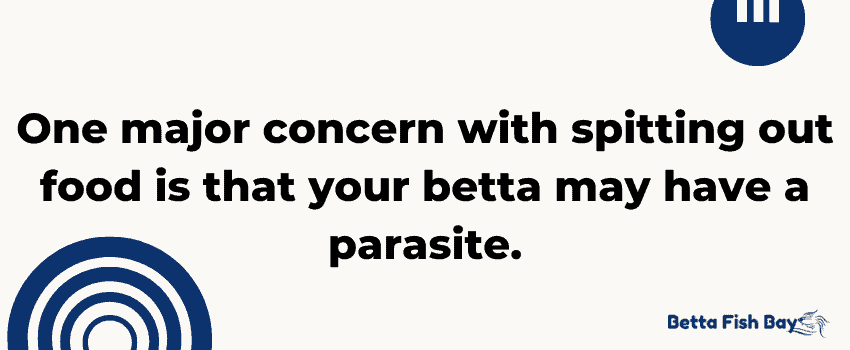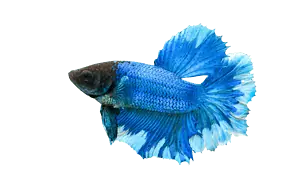Betta fish are hardy pets; this is why so many love them (including us!).
But sometimes their behavior is slightly alarming, such as when they keep spitting out their food.
It’s not always bad, but sometimes it signals a big problem. You need to know why your betta fish is spitting out food to determine when you need to act to help it.
Betta fish typically spit out their food because they have small stomachs and take too big of a bite, or they are just playing with it. Other non-emergency reasons include not recognizing it as food, getting older, and being picky. But in some cases, it’s caused by constipation or parasites.

8 Reasons Why A Betta Spits Out Food
Knowing when to act and when to let them be is important to being a good betta owner.
Let’s talk about the main reasons they spit out their food and how to help them get back to eating their pellets or flakes.
#1 They Bite At Everything
Have you ever just sat there and watched your betta fish? They love to nibble.
After all, they are known as the Japanese Fighting Fish or Siamese Fighting Fish.
Their instinct is to bite or nip to explore things.
When you put their food in the tank, don’t automatically assume they know what it is (even if you’ve had them for years).
They may first test the food a few times to learn about it, especially if it’s a different brand.
Or they may just be playing with their food.
If they eventually eat it, it’s not worth worrying about.
#2 The Food Is Too Big
Betta fish take up a lot of space for their tiny stomachs. Their beautiful fins give them the illusion of being larger than they are!
If the food is too big for the betta’s mouth, they’ll spit it out and either wait for the water to break it up or nibble it down.
Some betta pellets and dry food swell quite a bit when exposed to water.
It may look the right size, but if the betta swallows it immediately, it’ll grow in its mouth.
Fortunately, bettas are smart enough not to choke on their food and spit it out.
Some “experts” say to pre-soak your food to prevent this from happening.
It’s hit or miss how much of a difference this truly makes.
Break the food for betta fish apart before putting it in there, or soak it first.
Either way will get the job done!
#3 Constipation In Betta Fish

The most common concern when a betta spits out food and refuses to eat is constipation.
They want the food, but when they put it in their body, there’s no room.
Up it comes in spitting form.
Constipation often passes on its own, so don’t panic right away.
Just make sure to remove the uneaten food so it doesn’t rot.
Betta can technically survive several days without any food at all. The longest we’d recommend is three days.
After this number, if they’re still not eating, it’s time to act.
Also, look for a bloated stomach and a lack of betta feces at the bottom of your tank. (This is why it’s essential to know your fish’s defecation schedule.)
If all three things are happening, it’s safe to say they’re constipated.
There are many home remedies for constipation, but we’d be reluctant to offer too many of them without the help of a qualified vet.
The one I’ve done (after talking with fish experts) is the fast-and-frozen method.
Have the fish fast (or not eat) for 24 hours. You may already be here if they haven’t eaten much.
Now, put in a single frozen pea (remove the “shell” of the pea first).
Whether they eat a lot of it or not, the pea will help them pass their feces.
Other methods include Epsom Salt or medications, but it’s best not to do these unless you’ve received specific instructions from a vet.
A simple call is usually all you need to do for help.
Check out our guide on constipation in betta fish for more details on how to help.
#4 It’s Not Used To Commerical Food
Juvenile bettas and some betta breeders only eat “real food” or live food, such as brine shrimp or mosquito larvae.
When you adopt them and they don’t eat your pellets or fish flake foods, they may not recognize this as real food.
Given time, they’ll adjust to their pellets, but you’ll want to ensure it’s an appropriate and protein-rich diet.
These fish are carnivores, after all.
Offer some real food like Brine Shrimp, Daphnia, or Bloodworms and see if they eat them. Insect larvae are also good options.
Any protein-rich live food or insect natural to the betta is good.
If so, it’s a food-type issue rather than a digestive one.
#5 It Has A Parasite

One major concern with spitting out food is your betta fish has a parasite.
This is pretty far down the list as far as likelihood goes.
By the time you notice the spitting of food, you’ll probably notice other symptoms first.
But parasites may cause your fish to spit out its food due to stress or bloating.
Here are the signs to watch out for:
- Lethargy (lack of movement)
- Lack of appetite
- Spitting out food
- Weight loss
- Diarrhea
- Stress Stripes*
*Read more about betta stress stripes, causes, and solutions in our article at the link.
If your betta has a parasite or you suspect it does, move it to a quarantine tank first. Use some of the water from the original tank to balance the bacteria in the separate tank.
Then, call a veterinarian.
There are medications to help, but you don’t want to use them unless the vet tells you to.
#6 The Betta Is Getting Older
Another reason your betta may refuse to eat for a while is that it’s getting older.
As bettas age, they eat less. And they like to work for their food less.
What would have been a fine size at a younger age is now too much work, or they just ate earlier and are still full.
Betta fish live, on average, 2-4 years with the chance to go a couple more years if well-cared-for.
If your betta is around this four-year mark, consider feeding them a little less often.
If this helps, then the reason they were spitting was because of age.
But if they continue to refuse to eat, you may have something more on your hands.
#7 Your Betta Fish Is A Picky Eater

Bettas have unique personalities, just like people do. And people have their own diet preferences.
If you have kids, you know exactly what I’m talking about. I can’t get my middle child to eat more than peanut butter and jelly sandwiches and pizza anymore.
Bettas can go through the same phases and have similar pickiness in their eating.
Some bettas just hate the type of food you’re giving them.
They’d almost rather starve than eat it. They may eat it eventually, but they’ll spit it out at first for a while and refuse to eat for a day or two.
If you suspect this is the reason they’re spitting food out, test it out by switching to another food.
Better yet, offer some live or frozen food options and see how they do. If they don’t gobble those right up, you’ll know something else is going on.
#8 Stress Prevents Much Eating
Betta may be a fighting fish, but this doesn’t mean they don’t get stressed or have the instinct to hide.
A stressed-out animal won’t eat much. They’re focused on defending themselves.
Even if they’re hungry enough to eat, they’ll spit it out when something spooks them.
Signs of betta stress may include:
- Flashing or rubbing against objects in the tank
- Loss of appetite or refusal to eat
- Clamped fins (held close to the body)
- Rapid breathing or panting
- Pale or dull coloring
- Hiding or attempting to escape the tank
- Stress stripes
Bettas get stressed for many reasons. From too much light, noise, or movement to other fish bugging them.
But the biggest reason is also the least visible: improper water conditions.
Bettas can handle almost anything, but nothing else will go well if the water’s not right.
Here is our official recommendation for a betta’s water conditions based on our experience in working with a certified vet:
Ideal Water Parameters for a Betta Fish Tank Include the following:
- Temperature: 78-80° degrees Fahrenheit (25.5-27° C)
- pH: 6.5-7.5
- Ammonia and Nitrite: 0 ppm
- Nitrate: < 40 ppm
- gH: 3-4 dGH (50-66.7 ppm)
- kH: 3-5 dKH (53.6-89.4 ppm)
- Minimum Tank Size: 5 Gallons
Check these conditions when your betta is spitting out food a lot to see if there’s a hidden problem.
Catching it early will minimize the damage.
Get Your Betta Back To Eating
When your betta fish spits out or nibbles food, it’s easy to worry, but most of the time, it’s nothing.
Check to see if it’s eating at all or if there are other signs of illness. If so, contact a vet.
Otherwise, watch them and consider switching up the food.
Speaking of betta food, check out our top picks for betta fish food to keep them healthy and live longer.


